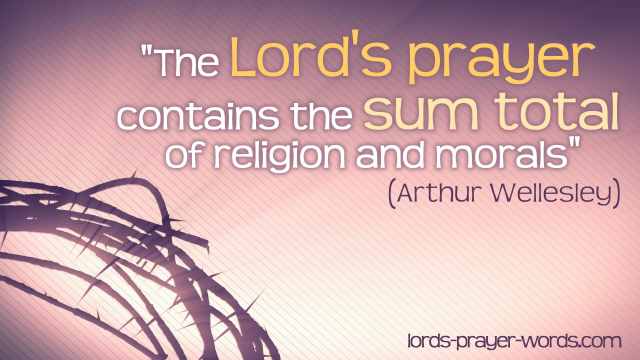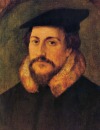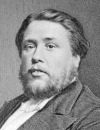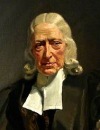Commentary on the Lord's Prayer
by John Calvin - Matthew chapter 6 verse 10
10. May thy kingdom come
Though the Greek verb (ἐλθέτω) is simple, yet if, instead of May thy kingdom come, we read, as it was rendered in the old translation, May thy kingdom arrive, 435 Adveniat regnum tuum;” the only difference being, that the compound verb adveniat, may arrive, has been exchanged for the simple verb veniat, may come, a change which has been adopted, so far as I have observed, in the modern European versions. — Ed. the meaning will remain unchanged. We must first attend to the definition of the kingdom of God. He is said to reign among men, when they voluntarily devote and submit themselves to be governed by him, placing their flesh under the yoke, and renouncing their desires. Such is the corruption of the nature, that all our affections are so many soldiers of Satan, who oppose the justice of God, and consequently obstruct or disturb his reign. By this prayer we ask, that he may remove all hindrances, and may bring all men under his dominion, and may lead them to meditate on the heavenly life.
This is done partly by the preaching of the word, and partly by the secret power of the Spirit. It is his will to govern men by his word: but as the bare voice, if the inward power of the Spirit be not added, does not pierce the hearts of men, both must be joined together, in order that the kingdom of God may be established. We therefore pray that God would exert his power, both by the Word and by the Spirit, that the whole world may willingly submit to him. The kingdomof God is opposed to all disorder (ἀταξία) and confusion for good order is nowhere found in the world, except when he regulates by his hand the schemes and dispositions of men. Hence we conclude, that the commencement of the reign of God in us is the destruction of the old man, and the denial of ourselves, that we may be renewed to another life.
There is still another way in which God reigns; and that is, when he overthrows his enemies, and compels them, with Satan their head, to yield a reluctant subjection to his authority, “till they all be made his footstools” (Hebrews 10:13 .) The substance of this prayer is, that God would enlighten the world by the light of his Word, — would form the hearts of men, by the influences of his Spirit, to obey his justice, and would restore to order, by the gracious exercise of his power, all the disorder that exists in the world. Now, he commences his reign by subduing the desires of our flesh. Again, as the kingdomof God is continually growing and advancing to the end of the world, we must pray every day that it may come: for to whatever extent iniquity abounds in the world, to such an extent the kingdom of God, which brings along with it perfect righteousness, is not yet come.
May thy will be done Although the will of God, viewed in itself, is one and simple, it is presented to us in Scripture under a twofold aspect. 436 “Elle nous est proposee en deux sortes es Escritures.” — “It is presented to us in two ways in the Scriptures.”
It is said, that the will of God is done, when he executes the secret counsels of his providence, however obstinately men may strive to oppose him. But here we are commanded to pray that, in another sense, his will may be done, — that all creatures may obey him, without opposition, and without reluctance. This appears more clearly from the comparison, as in heaven For, as He has the angels constantly ready to execute his commands, (and hence they are said to do his commandments, hearkening to the voice of his word, Psalm 103:20,) so we desire that all men may have their will formed to such harmony with the righteousness of God, that they may freely bend in whatever direction he shall appoint. It is, no doubt, a holy desire, when we bow to the will of God, and acquiesce in his appointments. But this prayer implies something more. It is a prayer, that God may remove all the obstinacy of men, which rises in unceasing rebellion against him, and may render them gentle and submissive, that they may not wish or desire any thing but what pleases him, and meets his approbation.
But it may be objected: Ought we to ask from God what, he declares, will never exist to the end of the world? I reply: When we pray that the earth may become obedient to the will of God, it is not necessary that we should look particularly at every individual. It is enough for us to declare, by such a prayer as this, that we hate and regret whatever we perceive to be contrary to the will of God, and long for its utter destruction, not only that it may be the rule of all our affections, but that we may yield ourselves without reserve, and with all cheerfulness, to its fulfillment.
John Calvin (1509-1564)
Commentary on Matthew, Mark, Luke - Volume 1
Next: John Calvin on Matthew 6:11

About the writers here
 John Calvin (1507-1564) was part of the reformation movement of the sixteenth century. His most notable theological stance is the belief that God is sovereign in the matters of salvation and election.
John Calvin (1507-1564) was part of the reformation movement of the sixteenth century. His most notable theological stance is the belief that God is sovereign in the matters of salvation and election.
Alexander Maclaren (1826-1910) was a English Baptist minister. He is most famous for his expository style, drawing on examples from life and nature to develop biblical truths. The commentaries in this section are taken from his writings on the version of the Lord's prayer in Luke's Gospel.
 Charles Haddon Spurgeon (1834-92) is one of the most famous preachers of the nineteenth century. The two sermons found in this section record some fascinating insights into the Lord's prayer.
Charles Haddon Spurgeon (1834-92) is one of the most famous preachers of the nineteenth century. The two sermons found in this section record some fascinating insights into the Lord's prayer.
 John Wesley (born 1703, died aged 87 in 1791) is the founder of the modern day Methodist movement. His most famous theological insight is "Christian Perfection", a belief that the love of God can reign supreme in the believers heart.
John Wesley (born 1703, died aged 87 in 1791) is the founder of the modern day Methodist movement. His most famous theological insight is "Christian Perfection", a belief that the love of God can reign supreme in the believers heart.
find out more about the Lord's Prayer in our Line-by-line commentary section
